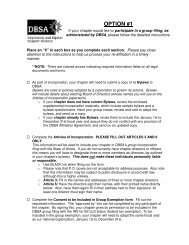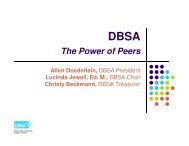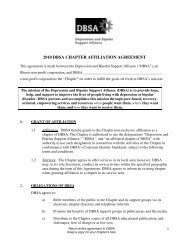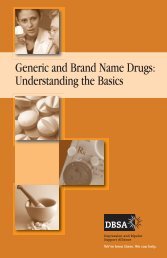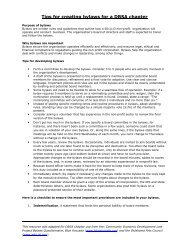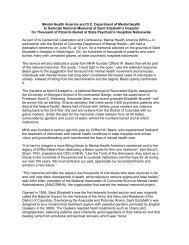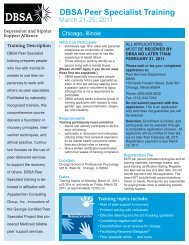Bauer PowerPoint - Depression and Bipolar Support Alliance
Bauer PowerPoint - Depression and Bipolar Support Alliance
Bauer PowerPoint - Depression and Bipolar Support Alliance
Create successful ePaper yourself
Turn your PDF publications into a flip-book with our unique Google optimized e-Paper software.
A Values-Based Approach to<br />
Managing <strong>Bipolar</strong> Disorder<br />
Mark S. <strong>Bauer</strong>, M.D.<br />
Boston VA Healthcare System<br />
Harvard Medical School
Declaration of Involvements<br />
Royalties:<br />
•Springer<br />
•New Harbinger (~$200/yr)<br />
Acknowledgements:<br />
• Amy Kilbourne, PhD<br />
University of Michigan & Ann Arbor VAMC
Workshop Outline<br />
Background on Life Goals Collaborative Care<br />
LGCC Principles & Techniques<br />
Some Exercises on Spirit & Technique
Workshop Outline<br />
Background on Life Goals Collaborative Care<br />
LGCC Principles & Techniques<br />
Some Exercises on Spirit & Technique
<strong>Bipolar</strong> LGCC Development<br />
1992: Expert/patient consults & program development<br />
1996: Single site population-based open trial (n=103)<br />
Publication of first treatment manual<br />
1997-2004: 11-site, 3-year VA RCT<br />
1998-2003: 4-site, 2-year NIMH R-01 HMO RCT (Simon)<br />
2006: Med-psych pilot VA RCT (Kilbourne)<br />
Publication of revised treatment manual<br />
2006-2011: Adaptation pilot RCTs for metabolic risk, broader group of<br />
mood disorders & SMI(Kilbourne)<br />
Implementation RCT (Colorado, Michigan)<br />
2009: Publication of patient workbook<br />
Development of therapist manual for individual work<br />
2011: VA TeleHealth LGCC roll-out
LGCC for <strong>Bipolar</strong> Disorder:<br />
The “<strong>Bipolar</strong> Disorders Program”<br />
Provider<br />
<strong>Support</strong><br />
Patient<br />
Education<br />
Access/Continuity<br />
Simplified<br />
Practice Guidelines<br />
Life Goals<br />
Program<br />
Health Specialist
Workshop Outline<br />
Background on Life Goals Collaborative Care<br />
LGCC Principles & Techniques<br />
Some Exercises on Spirit & Technique
LGCC for <strong>Bipolar</strong> Disorder:<br />
The “<strong>Bipolar</strong> Disorders Program”<br />
Provider<br />
<strong>Support</strong><br />
Patient<br />
Education<br />
Access/Continuity<br />
Life Goals<br />
Program
Why a Psychosocial Component<br />
for <strong>Bipolar</strong> Disorder?<br />
To supplement (not replace) medical-model<br />
treatment:<br />
Compliance is low—about 50% adequate<br />
Address independent determinants of disease<br />
outcome (stressors, comorbidities)<br />
Poor social role function <strong>and</strong> quality of life<br />
• Only 1/3 return to pre-morbid function & 1/3 rated<br />
poor<br />
• <strong>Depression</strong> Functional status<br />
• No change with the Modern (Psychopharm) Era
The Traditional View of Treatment
The Traditional View of Treatment
The Traditional View of Treatment<br />
The patient comes to buy a product or service.<br />
We are willing purveyors of the product or<br />
service.<br />
They get what they came for.<br />
We each profit in tangible/intangible ways.
What’s Wrong with this Picture?<br />
“Compliance”: The extent to which a person’s<br />
behavior co-incides with medical advice (Haynes,<br />
1979)<br />
“Adherence”: The new Politically Correct term<br />
But either way: “Authority of medical<br />
professionals” is the focus (Troestle, 2000)<br />
• Well, what’s wrong with that?
<strong>Bipolar</strong> Disorder Outcome:<br />
Over-Simplified<br />
Disease<br />
Process<br />
Outcome
<strong>Bipolar</strong> Disorder Outcome:<br />
The Real World<br />
Host<br />
Factors<br />
Disease<br />
Process<br />
Illness<br />
Management<br />
Skills*<br />
Outcome<br />
* “…the ability of a person to:<br />
• cope with his or her illness <strong>and</strong><br />
• participate actively in treatment.”<br />
<strong>Bauer</strong> MS, McBride L. Structured Group Psychotherapy for <strong>Bipolar</strong><br />
Disorder: The Life Goals Program, 2 nd Edition (Springer, 2003)
A Model for Treatment Participation<br />
(exp<strong>and</strong>ed from Riolo & Weston 2008)<br />
Family & caregiver<br />
attitudes<br />
Beliefs &<br />
attitudes<br />
Perceived<br />
stigma<br />
Relationship<br />
with clinician<br />
Illness<br />
Management<br />
Patient clinical<br />
characteristics, e.g.:<br />
Sx<br />
Cognition<br />
Volition/Subst Dep<br />
Clinician<br />
skills<br />
Personal<br />
cost-benefit<br />
analysis<br />
Pragmatics, e.g.:<br />
$<br />
Distance<br />
Time<br />
Home support<br />
Clinician<br />
attitudes<br />
Regimen<br />
complexity
“Thus I<br />
say…”<br />
PATERNALISTIC MEDICINE<br />
“Yes I<br />
shall!”<br />
“Load<br />
‘em on.”<br />
MATERNALISTIC MEDICINE<br />
“Fix my<br />
problems!”<br />
Technical<br />
Expert<br />
COLLABORATIVE PRACTICE<br />
Values<br />
Expert<br />
[ COACH/ATHLETE ]
Roots of Life Goals<br />
Expert consultation with patients, providers &<br />
academic experts<br />
Lorig Chronic Disease Self-Mgt. Groups<br />
Motivational Interviewing<br />
•Spirit<br />
•Techniques (e.g., decisional balance)<br />
Psychoeducation<br />
CBT (CBT)
Life Goals Format Issues<br />
Individual-focused (lack of family support)<br />
Public sector population (effectiveness)<br />
Public sector system constraints (reach,<br />
spread, sustainability)<br />
Group-based (initially)
Life Goals Outline<br />
Formats:<br />
• Group-Based, Weekly, 6-8 members<br />
• Individual, Weekly (in-person or tele)<br />
Life Goals “Classic”: Illness Management Skills<br />
• Session 1: Values & Goals<br />
• Sessions 2-3: Mania<br />
• Sessions 4-5: <strong>Depression</strong><br />
• Session 6: Managing Your Care<br />
Modular Patient-Centered Follow-On
Values & Goals<br />
Mania, <strong>Depression</strong>,<br />
Managing Your Care<br />
(6 Sessions)<br />
Life Goals Classic<br />
(Phase 1)<br />
Enhanced Life Goals<br />
Modules<br />
Substance Anxiety<br />
Use Psychosis Anger &<br />
Irritability<br />
Enhanced<br />
Physical<br />
CBT<br />
Wellness<br />
Functional<br />
Goal<br />
Attainment<br />
(ongoing, iterative)<br />
Life Goals Classic<br />
(Phase 2)
Life Goals Individual Session<br />
Outline<br />
Check-In<br />
Focus Point(s)<br />
Exercise Instructions<br />
Exercise<br />
Exercise Review<br />
Session Close (& optional homework)
The Life Goals Phase 1 Tasks:<br />
Beyond Traditional Psychoeducation<br />
•General Information<br />
•Personal Symptom Profile(s)<br />
•Early Warning Signs<br />
•Triggers<br />
•Coping Responses: Evaluation & Revision<br />
•Personal Cost Benefit Analysis<br />
•Action Plan / Personal Care Plan<br />
Psychoeducation as laboratory course, not lecture
Health Beliefs Model<br />
(Becker & Jantz 1984)<br />
Patients make rational decisions about treatment<br />
based on their own analysis of potential costs<br />
<strong>and</strong> potential benefits.
Critical Life Goals Concept:<br />
Personal Cost-Benefit Analysis<br />
“Individuals always act in their own perceived best<br />
interest.”<br />
Elucidate all costs & all benefits.<br />
Always from the individual’s perspective<br />
• Not yours, not the family’s, not the ideal<br />
• Make the pre-conscious conscious:<br />
• “Elucidate, evaluate.”<br />
Exercise:<br />
• Alcohol to treat depression<br />
• Keeping Wednesday’s appointment with your psychiatrist.
Life Goals Component Example:<br />
Personal Cost-Benefit Analysis:<br />
for Mania
Workshop Outline<br />
Background on Life Goals Collaborative Care<br />
LGCC Principles & Techniques<br />
Some Exercises on Spirit & Technique



